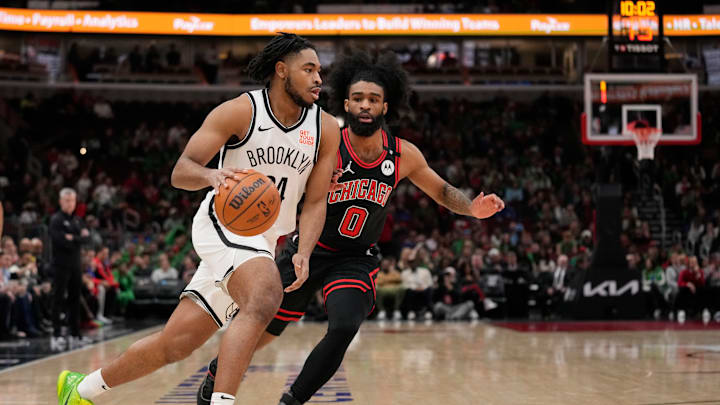As if navigating Josh Giddey’s contract conundrum weren’t exhausting enough, the Chicago Bulls will soon be facing another round of tense negotiations. Last season’s leading scorer, Coby White, is entering the final year of the three-year, $36 million deal he signed in 2023. Coming off his best professional season, at only 25 years old, he’s positioned for a significant payday.
White has steadily improved since signing his team-friendly contract two years ago. The North Carolina product re-upped with Chicago after his worst professional season, when he averaged just 9.7 points, 2.9 rebounds, and 2.8 assists in 23.4 minutes per game. Given the downturn, a modest deal was expected.
Coby White has improved, but lacks consistency
Yet, over the past two seasons, he’s emerged as far more than the Bulls expected. In 2023-24, White set career highs with 19.1 points, 4.5 rebounds, and 5.1 assists in 36.5 minutes per game, starting 78 of his 79 appearances. His breakout campaign culminated in a runner-up finish for the Most Improved Player award.
Then came this past season, arguably White's best of his career, though it didn't start smoothly. He carried over his 2023-24 form in November, only to hit a slump in December, shooting 39.4 percent from the field and 29.3 percent from three. January brought a return to form, with White’s efficiency climbing back up as he averaged nearly 20 points per game.
However, White’s efficiency and scoring both dipped again in February, coinciding with Zach LaVine’s departure. Doubts surfaced about whether the combo guard could shoulder Chicago’s primary scoring load.
By now, you get how the story goes. White impressed in March, earning Eastern Conference Player of the Month honors as he averaged 27.7 points, 4.7 rebounds, and 3.7 assists per game while shooting 49.5 percent from the field and 37.9 percent from beyond the arc. He closed the season strong, too, averaging 22.0 points, 4.7 rebounds, and 5.0 assists in April while converting 54.4 percent of his field goals and 40.0 percent of his triples.
White proved he’s one of the league’s more versatile scoring guards, a true do-it-all talent. He led the NBA in transition points per game and ranked among the top 25 in three-pointers and pull-up jumpers.
Even so, scoring volume alone may not be enough to secure the contract White reportedly seeks. According to NBA insider Jake Fischer, he is aiming for a deal worth $30 million per year—the same figure Giddey pursued.
White must bring more to the table than scoring
Nonetheless, we just saw a player averaging 22.9 points per game while shooting a respectable 44.1 percent from the floor and 35.9 percent from three, choose to sign a one-year, $5.9 million qualifying offer. That player is Brooklyn’s Cam Thomas, who reportedly had at most a two-year, $30 million offer on the table.
Digging deeper, Thomas averaged a career-high 3.8 assists a season ago, to go along with 3.3 rebounds and 0.6 steals per game. Moreover, his paltry 120.6 defensive rating ranked last on the Nets by a significant margin.
For comparison, White averaged 4.5 assists, 3.7 rebounds, 0.9 steals, and posted a 113.9 defensive rating last season. Overall, the former Tar Heels’ numbers and defensive rating surpass Thomas’s, though it must be taken into account that he has two more seasons of experience.
White is unlikely to struggle securing a sizable contract, but starting at $30 million may be ambitious for now. Like Thomas, he’s a proven scorer, yet his consistency, playmaking, and defense still leave room for improvement.
Next year won’t necessarily be a make-or-break season for White. What it will be is his audition for a contract worth well over $100 million. To ensure he secures a deal to his liking, he must make significant improvements on both ends of the floor.
On offense, White’s success will hinge on his month-by-month consistency. As Chicago’s No. 1 option, he must play like the team’s primary scorer, averaging more than 20 points each month. Additionally, as a guard with a high usage rate (over 24%), he needs to raise his assist rate, particularly as he continues to attack the rim and push the pace in transition.
Lastly, White's defense has improved over the course of his career, but at the same time, Chicago has never been better defensively with him on the floor. He has never averaged more than one steal per game, nor has he consistently limited opponents’ shooting when serving as the primary defender. Averaging at least one steal per game, demonstrating some sense of defensive playmaking, or forcing his opponents’ field-goal percentages to decrease would go a long way in strengthening his case for a sizable contract.
